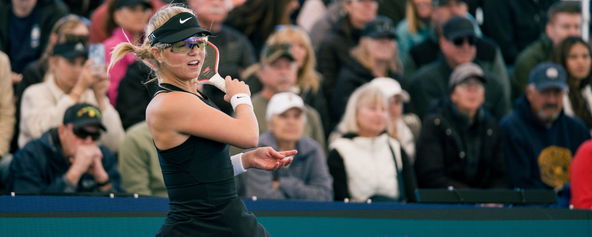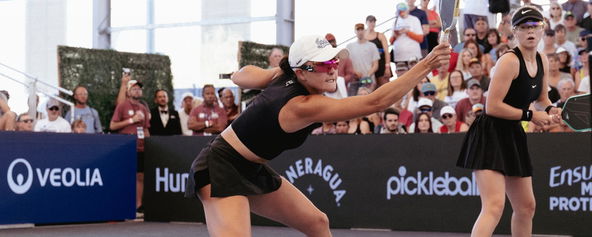
An in-depth look at the CIBC Atlanta Slam Men’s Doubles Final: Were Collin Johns’ critics wrong?
Jim Kloss
Sep 16, 2024 08:15 PM ET
One of the most-discussed pickleball topics of 2024 concerns whether the game has changed, how much it has sped up, and whether Collin Johns has adjusted to the new style. Collin and Ben Johns have been supremely successful as a men’s doubles duo for the past couple of years. They set an incredibly high standard in 2023, one that anyone would have a hard time duplicating.
In 2024, the Johns have not been nearly as successful as they were in 2023. The game has certainly changed in 2024, with power and speed taking center stage. The drive, the shake and bake, and the speedup have become much more prevalent. Approaching the CIBC Atlanta Slam, the Johns brothers had not won a men’s doubles final in five months, the longest drought of their partnership. Social media was full of speculation about whether the game had passed Collin by, whether he could adjust to the new style, or whether Ben should find a new, more aggressive partner.
All of the chatter led to Atlanta. There, the Johns brothers avenged recent losses to Andrei Daescu/Gabe Tardio and Christian Alshon/Riley Newman. Those victories led to the Johns brothers facing Tyson McGuffin and Jaume Martinez Vich in the gold medal final. McGuffin and Martinez Vich got to the final playing a very fast paced game, full of power and speedups. If you wanted to see long dink rallies, watching McGuffin and Martinez Vich was not where you wanted to be.
The Johns brothers prevailed in four games. The score was 11-4, 11-0, 6-11, 11-4. The first two games were dominated by Collin and Ben. McGuffin and Martinez Vich fought back with a solid game three win, but the Johns brothers closed it out with a fairly easy game four. In looking at the stats on the match, what was different about game three? What, if anything, was different about the play of Collin from what we have seen before? Did everyone really play fast? Let’s look at the stats, as they tell a very clear story, answering all of these questions.
Games one and two, combined:
Ben Johns: 3/3 on speedups, 10 drives, 8 drops
Collin Johns: 4/7 on speedups, 9 drives, 2 drops
Tyson McGuffin: 2/5 on speedups, 3 drives, 1 drop
Jaume Martinez Vich: 5/13 on speedups, 5 drives, 6 drops
Speedups include any time a player has a kitchen area shot and could reasonably play a dink or a drive, and they choose to speed it up. Success is whether that player’s team won or lost the rally, regardless of why. The drive and drop stats are off third shots.
Note: There were some technical glitches with the video feed, so about six or seven points are missing.
Note: There were some technical glitches with the video feed, so about six or seven points are missing.
Game three (won by McGuffin/Martinez Vich):
Ben Johns: 2/3 on speedups, 3 drives, 3 drops
Collin Johns: 1/2 on speedups, 3 drives, 1 drop
Tyson McGuffin: 1/3 on speedups, 3 drives, 2 drops
Jaume Martinez Vich: 5/5 on speedups, 7 drives, 1 drop
Game four:
Ben Johns: 1/1 on speedups, 9 drives, 2 drops
Collin Johns: 3/4 on speedups, 4 drives, 1 drop
Tyson McGuffin: 2/5 on speedups, 2 drives, 0 drops
Jaume Martinez Vich: 1/2 on speedups, 5 drives, 2 drops
The statistics paint a clear picture. Here’s what we learned:
1. As usual, the more successful team on speedups won. Each game was won by the more successful team on speedups. As has been repeatedly demonstrated, winning the speedup battle has well over a 90% correlation to winning a game or a match. The stat was perfectly predictive once again on this match.
2. Collin did indeed massively change his game for Atlanta. I went back and looked at the stats from multiple matches played by Ben and Collin in 2023, where I kept the stats. In 2023, Collin averaged slightly under one speedup per game. In the Atlanta men’s final, Collin averaged over three speedups per game. In other words, he more than tripled his propensity to speed up the ball.
3. In 2023, I did not chart drives v drops, as dropping the ball was way more prevalent. However, observation of those matches tells us that Collin rarely drove thirds. In Atlanta, Collin drove his thirds 80% of the time! The aggressive style being played by McGuffin and Martinez Vich was all the talk, but who would have guessed that Collin was driving the ball as much or more than anyone?
4. Dave Fleming did the commentary on the match. He was spot on in his analysis. In game one, he said of Collin that he was “more aggressive from the get go”. In game four, Fleming said, “that’s the new CJ right there” after a speedup. Also in game four, Fleming said of Collin, “he can’t just be this passive player any more.”
There’s been a lot of talk about whether Collin’s “critics” were wrong and if he “showed them” in Atlanta. The fact is that the “critics” got it exactly right; Collin needed to change his game to compete. As Dave Fleming so correctly said during the telecast, “[Collin] has gone into the lab and he has to play different.” Collin played very differently in Atlanta than he has played before. He correctly and obviously agreed with commentators who pointed out that his previous, passive style was not going to be successful. He correctly and obviously changed his game, fairly dramatically in Atlanta, and that was what led to his success.
Congratulations to Ben and Colin on their victory in Atlanta. But even more so, kudos to Collin for recognizing that he needed to change, and he needed to be more aggressive. Expect to see the new, aggressive Collin in the future.
Follow me on Twitter/X @pickleball_jim.
Related articles

Carvana PPA Tour announces 2026-2027 schedule featuring marquee U.S. and international events
The health of professional pickleball has never been stronger.
4 hours ago
-PPA Staff

Sofia Sewing joining PPA Tour in January 2027
The standout talent will be an exciting addition to the circuit.
6 hours ago
-Pickleball.com Staff

Big crowds and a big upset at Carvana Mesa Cup
The play did not disappoint as Anna Leigh Waters and Ben Johns both went into Sunday with a shot at a Triple Crown.
1 day ago
-Jim Kloss

HAWORTH TOPPLES JOHNS, WATERS DEFEATS FAHEY, #1 SEEDS TAKE DOUBLES TITLES
“You guys should know by now, we’re going to Korean barbecue and we might go to the casino. At this point, it’s kind of… how do you say it? Tradition.” —Gabe Tardio
1 day ago
-Hannah Johns